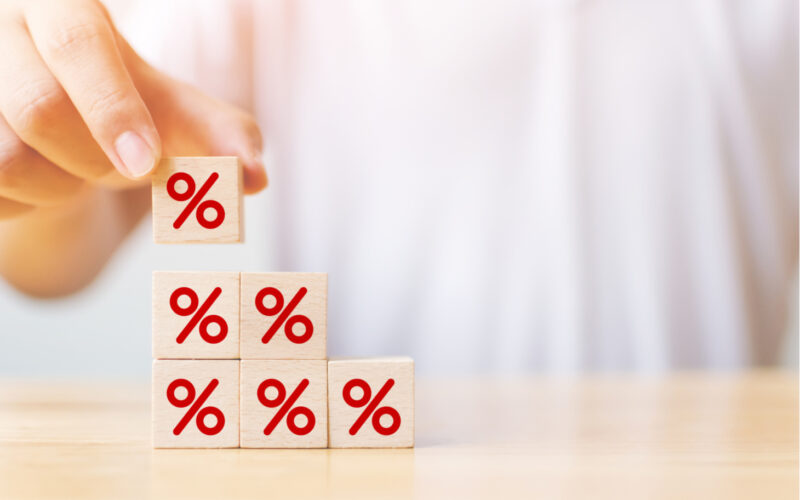Don’t panic, unless you’re a central banker. In which case, what the hell are you doing reading this? Don’t you know that inflation is above 7% in the United States and expected to hit that level in the UK? Aren’t you supposed to be busy raising interest rates as fast as you can?
Only days ago, I was reading about the impossibility of a 0.5% interest rate hike in the United States (in a tweet that has mysteriously disappeared from my feed since). Next minute, I’m reading of the market pricing in a 100% chance of a 0.5% interest rate hike…
One minute Reuters reports that Federal Reserve policy-maker “Bullard does not think a half-point rate hike ‘really helps us’” and the next minute the same guy is “urging” one.
Why? Because inflation is continuing to spike more than expected.
Or is that an oxymoron? A continuing spike is really just high inflation, isn’t it?
The reaction from those charged with keeping a lid of inflation has been just as chaotic as the inflation data itself. Even markets are getting confused by policy-makers’ stances on inflation.
Financial markets are (supposed to be) more than one step ahead of what’s actually going on. They also like to price in the direction of change rather than the change itself – good news and bad news matters less than whether the news was better or worse than expected.
This leads to some bizarre market action, on occasion. Well, it’s only bizarre if you’re a step behind the market.
Do you remember when good news was bad news and bad news was good news? The idea, back then, was that good news would bring on tighter monetary policy, which was bad for financial markets. And so, the better the news got from the economy, the worse markets performed…
Bad news gave policy-makers an excuse to continue their zero per cent interest rates and quantitative easing (QE – the creation of money out of thin air to buy bonds) a little longer. Which was good for financial markets. And so bad economic data saw markets rise.
It seemed odd, but it made sense in a world of heavy-handed central bank intervention.
But these days, things don’t make so much sense.
Central banks are cornered because markets are far too overindebted thanks to Covid and years of low interest rates, as well as promises of years of more low interest rates to come. The risk of borrowing seemed irrelevant and so the world leveraged up.
But all this debt means that interest rates cannot be raised by much without triggering another debt crisis.
And then inflation came along, which should force central bankers to raise rates…
What a pickle (of their own making)!
Now, nobody knows how to interpret the inflation data. Is inflation good or bad for stocks? Are rising interest rates good or bad? Will rising rates trigger a debt crisis, or rein in inflation, or will they be too little too late to rein in the inflation that’s already spiralling out of control?
It’s not really clear any more. People cannot agree on a narrative, even one that doesn’t really make sense like they used to.
And so, the price action in asset markets is going haywire. Assets like gold, bitcoin, the US dollar, oil and bonds plunged and spiked all over the place in the United States as inflation news came out, and then again when the subsequent comments from central bankers were revealed. Many prices traded past the point where they began the day several times over, while jolting up and down…
And so now a single piece of news can mean many things for markets. And nobody can agree what it might mean.
A high inflation print can mean that inflation is spiralling out of control, or it can mean central banks will be forced to trigger deflation by raising rates too much too fast – the polar opposite outcome from the same piece of data.
But here’s what’s really going on underneath all this chaos. The central banks are trying to engineer what’s called a “soft landing,” in central-bank-speak. This is a mythical event which no economist has ever actually witnessed, making it rarer than a unicorn.
The basic idea is that you can slow down an economy with higher interest rates without triggering financial or economic carnage. That you can bring down inflation without causing a recession.
What happens instead when central banks try this is…well, some sort of financial or economic carnage and a recession.
The challenge for investors is simple. What will financial markets be pricing in next?
Will they price in soaring inflation? Or hiked interest rates? Or the recession/crisis which higher interest rates would cause, which would also bring down inflation again?
Of course, we might get all of those, in a sequence. Inflation might roar, triggering panicked interest rate hikes, triggering a crash.
And so it all becomes an age-old question: how far ahead does the market look? Because the cycle is known and understood. Boom, bust, inflation and deflation, it all repeats. And yet the market is jumping and jolting asset prices all over the place and back again. It’s trying to figure out which future event holds sway over today’s investment prices.
Have you noticed in all this how central banks are blatantly causing the business cycle, not smoothening it? They’re supposed to fiddle with interest rates to try and prevent busts and rein in booms. But they seem to be busily causing inflation and then triggering recessions in their attempt to rein their inflation in again.
And that’s the underlying point here – one I make a little too often, but you can blame central bankers and governments for the fact that I have to.
Intervention in the economy does not improve things. It worsens them. Price caps on energy cause energy price spikes. Low interest rates cause false booms, as we’ll dig into in tomorrow’s video for Fortune & Freedom. Fiscal stimulus reduces economic growth. And so on and so forth.
What we’re witnessing now is a period that follows record government intervention in the economy. Good or bad at the time, the point is that it’s going to prove a big problem in coming months. Just as all government interventions prove to be a problem eventually.
All this is what Paul was getting at in his question to Nigel Farage, too. And you can find out how Nigel answered here, in his latest Question Time video, where he answers a series of your questions.
By the way, we’ve had some excellent reader mail about whether higher interest rates actually bring down inflation at all. If you’re reading this, please send in your permission to republish your thoughts!
One last thing before you go. There’s one sector of the economy that always manages to escape the worst of government intervention, simply because it is too cutting edge to bridle. The regulators and the politicians simply cannot get a grip on high tech because the pace of innovation is too fast.
And there’s one key part of the economy that is miles ahead of governments, regulators and central banks right now. That’s why it’s booming. And why you need to see this.

Nick Hubble
Editor, Fortune & Freedom




